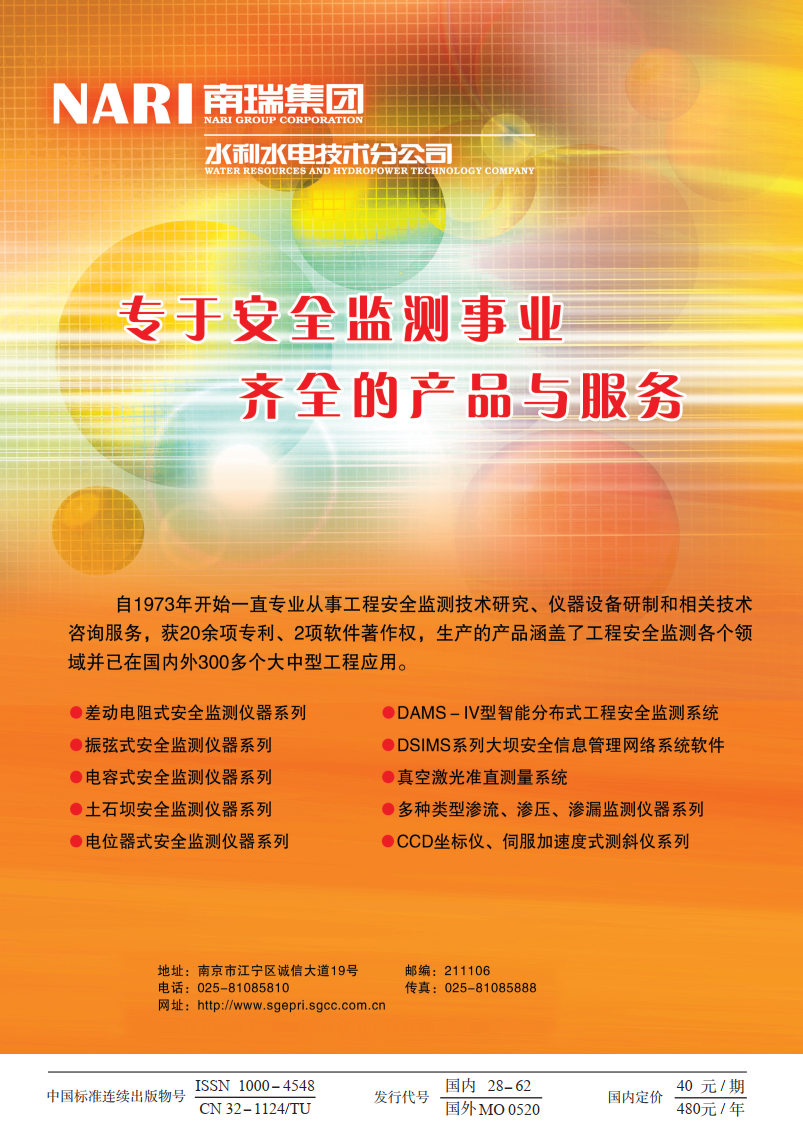Method for calculating pumping and recharging confined water inside and outside excavations under suspended waterproof curtain
-
摘要: 悬挂式止水帷幕下抽取坑内承压水时会对周边环境产生影响,地下水回灌能够有效控制坑外水位降深从而达到保护环境的目的。由于止水帷幕的存在,坑内外抽灌水使得基坑内外形成水位差。帷幕两侧水位差一方面是渗流方向和渗流路径的改变引起的,一方面是渗流面积减少引起的。通过数值模拟回归分析方法获得了基坑外回灌时帷幕两侧水位差的计算公式。将回灌时获得的水位差与笔者以往获得的基坑内抽水时止水帷幕两侧水位差的计算公式进行叠加,获得了基坑内外抽灌承压水时止水帷幕两侧水位差的计算公式。所提出的公式表明,帷幕两侧水位差与止水帷幕宽度及其进入承压含水层的深度、含水层各向异性、含水层的厚度以及无止水帷幕下抽灌承压水在帷幕处产生的水力梯度有关。最后通过工程实例对所提出的算法进行了验证。Abstract: The surrounding environment will be affected when the confined water in an excavation is pumped under a suspended waterproof curtain. The groundwater recharge can effectively control the groundwater drawdown outside the excavation so as to protect the environment. The existence of the waterproof curtain makes the head difference at two sides of the curtain during pumping and recharging of the confined water. The head difference is caused by the variation of seepage direction and path and the reduction of the seepage area. A series of equations to calculate the head difference during recharging outside the excavation are obtained by the numerical simulation regression method. The groundwater head difference during pumping-recharging action is the sum of the head difference during pumping and recharging, respectively. The proposed equations indicate that the head difference is related to the width of the waterproof curtain, the inserted depth of the waterproof curtain into the confined aquifer, the anisotropy of the aquifer, the thickness of the aquifer, and the hydraulic gradient under normal conditions. Finally, the proposed method is applied to a field case to verify its validity.
-
Keywords:
- waterproof curtain /
- confined aquifer /
- excavation /
- pumping-recharge action /
- head difference
-
-
表 1 模型计算参数
Table 1 Model parameters
土层名称 水文地质 厚度/m kx/(m·d-1) Kz/(m·d-1) Ss/m-1 ②粉质黏土 Aq0 3 8×10-4 5×10-4 1×10-6 ③淤泥质粉质黏土 5 5.1×10-4 2.7×10-4 1×10-6 ④淤泥质黏土 7 2.4×10-4 1.4×10-4 1×10-6 ⑤1-1黏土 AdI 5 3.03×10-3 1.74×10-3 1×10-6 ⑤1-2粉质黏土 6 2.5×10-4 1.17×10-3 1×10-6 ⑥粉质黏土 4 2.8×10-4 1.5×10-4 1×10-6 ⑦粉砂 AqI 10 3.6 3.6 6×10-5 ⑧粉质黏土 AdII 4 8×10-4 5×10-4 1×10-6 注:kx,kz分别为水平渗透系数和垂向渗透系数,Ss为储水率。 表 2 解析计算相关数值
Table 2 Relevant values of proposed method
Qw/(m3·d-1) r1/m r2/m r3/m r4/m i1ni1rn i2ni2rn 744 7.21 8.06 15.20 16.55 0.139 0.106 -360 9.53 8.49 27.65 28.90 0.070 0.027 表 3 回归公式法计算结果
Table 3 Calculated results by proposed method
条件 位置 符号 数值/m 抽水引起的水位差 C1、C2间 Δh1p 13.77 C3、C4间 Δh2p 10.51 回灌引起的水位差 C1、C2间 Δh1r 2.02 C3、C4间 Δh2r 1.02 抽灌共同引起的水位差 C1、C2间 Δh1 15.79 C3、C4间 Δh2 9.49 -
[1] 郑刚, 曹剑然, 程雪松, 等. 天津第二粉土粉砂微承压含水层回灌试验研究[J]. 岩土工程学报, 2018, 40(4): 592-601. doi: 10.11779/CJGE201804002 ZHENG Gang, CAO Jianran, CHENG Xuesong, et al. Experimental study on artificial recharge of second Tianjin silt and silty sand micro-confined aquifer[J]. Chinese Journal of Geotechnical Engineering, 2018, 40(4): 592-601. (in Chinese) doi: 10.11779/CJGE201804002
[2] 郑刚, 曹剑然, 程雪松, 等. 考虑承压含水层间越流的地下水回灌现场试验研究[J]. 岩土工程学报, 2019, 41(9): 1609-1618. doi: 10.11779/CJGE201909004 ZHENG Gang, CAO Jianran, CHENG Xuesong, et al. Field tests on groundwater recharge considering leakage between semiconfined aquifers[J]. Chinese Journal of Geotechnical Engineering, 2019, 41(9): 1609-1618. (in Chinese) doi: 10.11779/CJGE201909004
[3] 刘祥勇, 宋享桦, 谭勇, 等. 南通富水砂性地层地铁深基坑抽水回灌现场试验研究[J]. 岩土工程学报, 2020, 42(7): 1331-1340. doi: 10.11779/CJGE202007017 LIU Xiangyong, SONG Xianghua, TAN Yong, et al. Field tests on groundwater recharge of deep excavations in Nantong water-rich sandy stratum[J]. Chinese Journal of Geotechnical Engineering, 2020, 42(7): 1331-1340. (in Chinese) doi: 10.11779/CJGE202007017
[4] 陆建生, 潘伟强, 沈池, 等. 深基坑承压水抽灌一体化设计及工程应用[J]. 施工技术, 2014, 43(1): 48-52. https://www.cnki.com.cn/Article/CJFDTOTAL-SGJS201401016.htm LU Jiansheng, PAN Weiqiang, SHEN Chi, et al. Design and application on pumping-recharge integration system of deep foundation excavation[J]. Construction Technology, 2014, 43(1): 48-52. (in Chinese) https://www.cnki.com.cn/Article/CJFDTOTAL-SGJS201401016.htm
[5] ZHENG G, HA D, ZENG C, et al. Influence of the opening timing of recharge wells on settlement caused by dewatering in excavations[J]. Journal of Hydrology. 2019, 573: 534-545. doi: 10.1016/j.jhydrol.2019.03.079
[6] 李又云, 王欢, 苏世强, 等. 软土深基坑单井回灌参数优化与现场测试分析[J]. 地下空间与工程学报, 2021, 17(2): 520-528. https://www.cnki.com.cn/Article/CJFDTOTAL-BASE202102026.htm LI Youyun, WANG Huan, SU Shiqiang, et al. Parameters optimization and field test analysis on recharge well in deep foundation pit of soft soil[J]. Chinese Journal of Underground Space and Engineering, 2021, 17(2): 520-528. (in Chinese) https://www.cnki.com.cn/Article/CJFDTOTAL-BASE202102026.htm
[7] PUJADES E, LÓPEZ A, CARRERA J, et al. Barrier effect of underground structures on aquifers[J]. Engineering Geology, 2012, 145/146: 41-49.
[8] SHEN S L, WU Y X, MISRA A. Calculation of head difference at two sides of a cut-off barrier during excavation dewatering[J]. Computer and Geotechnics, 2017, 91: 192-202.
[9] WU Y X, SHEN S L, YUAN D J. Characteristics of dewatering induced drawdown curve under blocking effect of retaining wall in aquifer[J]. Journal of Hydrology, 2016, (539): 554-566.
[10] THIEM G. Hydrologische Methoden[M]. Gebhardt: Leipzig, 1906.
[11] KOZENY J. Theorie und berechnung der brunnen[J]. Wasserkraft und Wassenwirtschaft, 1933, 28: 88-92, 101-105, 113-116.
[12] 上海长凯岩土有限公司. 500 kV上海世博变电站工程群井抽水试验报告[R]. 上海: 上海长凯岩土有限公司, 2007. Shanghai Changkai Geotechnical Co, LTD. Report of group wells pumping test of 500KV Shanghai Expo Substation Project[R]. Shanghai: Shanghai Changkai Geotechnical Co, LTD, 2007. (in Chinese)
[13] WU Y X, SHEN J S, CHENG WC, et al. Semi-analytical solution to pumping test data with barrier, wellbore storage, and partial penetration effects[J]. Engneering Geology, 2017, 226: 44-51.




 下载:
下载:

















